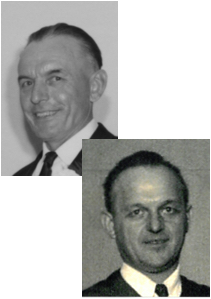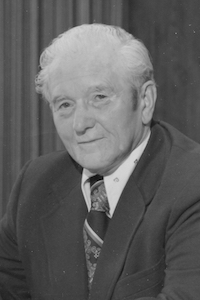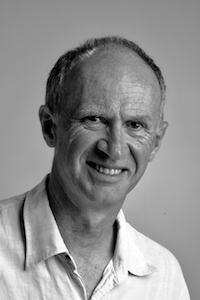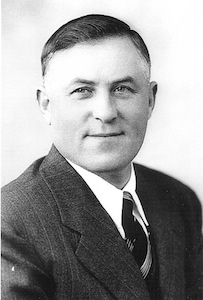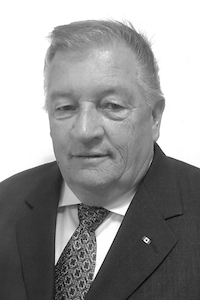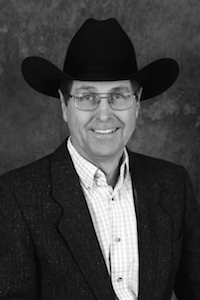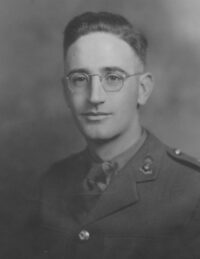Brothers William (top) and Frederick (bottom) Streich were born to Adolphe and Otillie Streich in 1911 and 1917 respectively. The boys grew up on a farm near Clandeboye, Manitoba. While raising his two sons and training them in farming practises, Adolph gave Bill and Fred two choices: They could receive wages or Adolph would bank and save the money for the future purchase of their own farms. The boys opted for the second option and would go on to raise their own spending money through their music. Fred played both the saxophone and clarinet and Bill played the banjo and guitar in a local band called ‘The Clandeboyes” which they formed with friends. Bill married Meta (Mae) Drewlo in 1935...
AHOF Members archive
Pakosh, Peter
Peter Pakosh was co-founder of Versatile Manufacturing Ltd., and is credited with many inventions and equipment innovations including the modern-day grain auger. He is considered an innovator in the field of agricultural machinery on a level with John Deere and Cyrus McCormick. Born in Canora, Saskatchewan on June 11, 1911, Pakosh was the second eldest of twelve children of Polish immigrants Emil and Claudia Pakosz. From an early age, Peter loved to work on farm machinery and at 15, his father bought a steam-threshing rig and assigned Peter to its upkeep and operation. In 1935, Peter’s father paid a cattle buyer $5 to take his son to Winnipeg where he pursued studies in mechanical engineering. In 1936, he married his...
Morriss, John
Born in Winnipeg in 1950, John Morriss started his career in 1973 at the Biomass Energy Institute, which researched the use of farm products for fuel. In 1975 he managed a travelling information display for the Hall Commission on grain handling and transportation. He then moved to farm journalism, working as a freelance writer and becoming the first field editor for Grainews later that year. In 1977 he joined the information department of the Canadian Wheat Board, becoming director in 1982. In 1989 John succeeded his father Bill Morriss as publisher and editor of the Manitoba Co-operator, where he became known for his weekly editorial commentaries on agricultural issues. While at the Co-operator he was part of its successful conversion...
4-H Manitoba Leaders
Since 1913, 4-H leaders have helped shape Manitoba’s youth into strong citizens of the province, the nation and the world. These leaders have remained innovative in developing programs that nurture citizenship, leadership, responsibility and independence in youth. Through their volunteer efforts these leaders have taught young future leaders the importance of hard work, setting and achieving personal goals, and instilling an obligation of service to community and others. By following the 4-H motto of “Learn to Do by Doing”, these leaders have shared their knowledge and skills and mentored youth in the development of life skills that have enabled them to achieve success in agriculture, business, home and community. The total contribution of 4-H members to society throughout their entire...
Schulz, Jacob (Jake)
Jake Schulz was born in Russia and raised in Romania. At age 20 he was promoted to Sergeant in the Romanian Calvary, and at 26 he was elected to his village council. In 1930, during the Great Depression, Jake, his wife, Amelia (Kelm), and their first child, Herbert, immigrated to Canada where they settled in the Grandview area. By 1936, the Schulzs had acquired an additional half section of land, which they eventually expanded into a successful two-section farm. Their second son, Paul and daughter, Lily were born in Canada. Mr. Schulz was an early adopter of new technologies: a one-way disc to replace the plow; a straw chopper on his combine; legumes to replace summerfallow; a generator to electrify...
Van Ryssel, Neil
A third generation farmer, Neil’s grandfather immigrated to Canada from Belgium in the early 1900’s and settled on the current farm in 1910. In high school, Neil began working with bees and eventually grew his operation to 200 hives. In 1970, he sold his bees when he and his father invested in a new free stall barn with milking parlour. Although his roots quickly grew deep in the dairy industry, he recognized early on that diversification would allow his family farm to flourish. Neil, and his son Jeff’s grain enterprise have since expanded to over 4,000 acres. Throughout his career, Neil has served in a variety of capacities including various directorships and presidential roles for local, provincial and national agricultural...
More, Dr. Everett
Dr. More was born in Deloraine, Manitoba and graduated in 1972 with a Doctor of Veterinary Medicine from the Western College of Veterinary Medicine in Saskatoon, Saskatchewan. Dr. More has practised Veterinary Medicine as a partner in the Virden Animal Hospital for 44 years. The focus of his practise has been on large animals with an emphasis placed on equine practise in the latter part of his career. Dr. More has been an integral part of the equine ranching industry for nearly five decades. His significant expertise in equine medicine has provided care to thousands of horses that produce pregnant mares’ urine. Estrogens are then extracted and made into medicine that millions of women in more than 100 countries...
Parker, Jack
John (Jack) Marsden Parker began his working career in 1938 working for the Dominion of Canada Department of Agriculture where he served under Dr. Ellis as part of the team that completed the Soil Survey of Manitoba. After serving overseas in WWII, he was hired in 1946 as the province’s first Soils Specialist with Manitoba Agriculture. He travelled the province identifying soil-related issues and designing on-farm programs to solve them. In 1954, the Minister of Agriculture established the Soils and Crops Branch and commissioned Jack to direct and supervise soils, crops, forage horticulture, and weed control services being delivered in Manitoba. Jack took it upon himself to organize “Save the Soils” clubs, and he engaged farmers in a variety of demonstrations...


